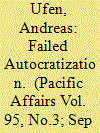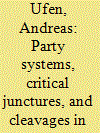|
|
|
Sort Order |
|
|
|
Items / Page
|
|
|
|
|
|
|
| Srl | Item |
| 1 |
ID:
179266


|
|
|
|
|
| Summary/Abstract |
In May 2018 the Malaysian governing coalition Pakatan Harapan (PH) lost in national elections for the first time since independence. But the subsequent reform process came to a sudden halt in February 2020. During transitions, unpredictability and risks for political actors are higher, and political conditions are extremely volatile. Multiparty coalitions such as PH have trouble sustaining the cohesion that was instrumental in their electoral victory. The highly polarized environment and the differing strategic calculations of PH coalition partners after the elections prompted the early downfall of the government. At the same time, the opposition, weakened shortly after the transitional elections, increased its cohesiveness and mobilized its supporters against the government in an environment of deep ethnoreligious cleavages. This paper traces the reform successes and failures of the PH government as well as the reconsolidation and strengthening of the new opposition, up to the emergence of the new Perikatan Nasional government.
|
|
|
|
|
|
|
|
|
|
|
|
|
|
|
|
| 2 |
ID:
187733


|
|
|
|
|
| Summary/Abstract |
Malaysian Prime Minister Najib Razak’s systematic strategy of autocratization backfired. This paper is based on a model of three pillars of authoritarian regimes. It traces the different strategies and measures employed to weaken the opposition and shows that major survival strategies were prone to frequent shifts. At the beginning of his tenure, Najib depicted himself as a reformer, and refined some forms of repression. The regime scrapped central coercive tools such as the Internal Security Act, but later replaced them with kindred, yet ineffective measures. Co-optation was more centralized and “money politics” expanded. The widespread and unprecedented usage of patronage resulted in corruption, which fundamentally destabilized the regime. Legitimation was modified since 2013 to a more Malay-centric and Islamist discourse. Because of this shift, legitimation eroded among ethnic and religious minorities. The prime minister’s legitimacy shrank due to corruption scandals. This paper helps gauge the lacking complementarity of the pillars and the failures of an authoritarian regime in crisis, which is important also with a view to political developments in Malaysia since 2018.
|
|
|
|
|
|
|
|
|
|
|
|
|
|
|
|
| 3 |
ID:
081541


|
|
|
|
|
| Publication |
2008.
|
| Summary/Abstract |
Surprisingly, the outcome of the 1999 and 2004 elections in Indonesia and the resultant constellation of political parties are reminiscent of the first Indonesian parliamentary democracy of the 1950s. The dynamics of party politics is still marked by aliran ('streams'): that is, some of the biggest political parties are still identified with specific milieux. But politik aliran lost a lot of its significance and re-emerged in a quite different form after the fall of Suharto in 1998. It is argued that parties are still socially rooted, so a modified aliran approach still has its analytical value. But one can witness a weakening of aliran (dealiranisasi) or dealignment of political parties. This dealignment is indicated by the rise of presidential or presidentialized parties, growing intra-party authoritarianism, the prevalence of 'money politics', the lack of meaningful political platforms, weak loyalties towards parties, cartelization and the upsurge of new local elites. The identification with certain parties has remained, but the ideological cement as well as the organizational base has been eroded. The reasons for this lie in reforms of formal institutions and social factors, ie shifts in the relationship between capital and the political class, altered educational patterns and the rising importance of mass medi
|
|
|
|
|
|
|
|
|
|
|
|
|
|
|
|
| 4 |
ID:
141906


|
|
|
|
|
| Summary/Abstract |
This article compares the financing of political parties and candidates in two Southeast Asian countries. In Malaysia, some political finance regulations exist only on paper, and political financing is for the most part not restrained at all. In contrast, the financing of candidates and parties has always been tightly circumscribed in Singapore. These different strategies, “laissez-faire” versus “strict control,” are the consequence of various factors. In Malaysia, the New Economic Policy has effected a close, often economically unproductive linkage between the state, the ruling Barisan Nasional coalition, and business. The rise of businesspeople has resulted in the commercialization of competition within (the United Malays National Organisation. Additionally, increasing competition between the ruling coalition and the opposition has resulted in growing expenditures for electioneering in the form of advertisements and electoral patronage. The laissez-faire style of regulation has been compounded by the difficult-to-control practices in East Malaysia (Sabah and Sarawak), where vote buying, electoral patronage based on the largesse of oligarchs, and obvious nonobservance of the rules have been typical. In contrast to Malaysia as a whole, the costs for parties and candidates are still relatively low in Singapore. As a cadre party, the PAP (People's Action Party) is relatively autonomous from private business interests, and intraparty competition is not commercialized; the developmentalist state is highly productive, and the ties between the state, the PAP, and business are not characterized by cronyism. Moreover, electioneering is not very commercialized because the opposition is still relatively weak.
|
|
|
|
|
|
|
|
|
|
|
|
|
|
|
|
| 5 |
ID:
113873


|
|
|
|
|
| Publication |
2012.
|
| Summary/Abstract |
This article differentiates between clientelist (Thailand and the Philippines) and cleavage-based parties and party systems (Malaysia and Indonesia) with reference to insights of historical institutionalism. Clientelist parties, in contrast to cleavage-based ones, often undermine democratization because, on average, representativeness is weak, bureaucracy is more politicized, and rent-seeking behavior is widespread.
|
|
|
|
|
|
|
|
|
|
|
|
|
|
|
|
| 6 |
ID:
141905


|
|
|
|
|
| Summary/Abstract |
The three articles in this themed collection investigate the interplay between political finance regimes and the quality of democracy in Southeast Asia. Andreas Ufen's piece on political finance in Malaysia and Singapore argues that the semi-authoritarian regimes in both states have blocked the reform of campaign and party funding regulations in order to keep their opposition in check. The article on Indonesia, authored by Marcus Mietzner, showcases the country's dysfunctional political finance system as a major hurdle toward further democratization. In their contribution on Thailand, Napisa Waitoolkiat and Paul Chambers show that weak political finance regulations have contributed significantly to the shallowness of Thai parties. Overall, the collection demonstrates that without meaningful political finance reforms, Southeast Asia's democratic stagnation is likely to persist for many years to come.
|
|
|
|
|
|
|
|
|
|
|
|
|
|
|
|
| 7 |
ID:
082782


|
|
|
|
|
| Publication |
2008.
|
| Summary/Abstract |
Is a higher degree of party and party system institutionalization positively correlated with the consolidation of democracy, defined here as the prevention of democratic breakdown? In order to answer this question, it is useful to compare different levels and types of institutionalization in three Southeast Asian electoral democracies. Institutionalized party systems are characterized, according to Mainwaring and Torcal, by 'stability of interparty competition.' Moreover, the distinction made by Levitsky ('value infusion' versus 'behavioural routinization') with reference to the institutionalization of individual parties will be employed. The empirical research of this paper finds that most Indonesian parties are better institutionalized than those in the Philippines and Thailand with reference to 'value infusion.' In addition, the interparty competition is more stable in Indonesia. Therefore, the probability of a collapse of the party system in the Philippines and Thailand is much higher. This, in turn, renders the democracies in these countries more fragile and prone to political crises or even sudden breakdowns. The early organizational consolidation of social cleavages, such as in Indonesia, enhances institutionalization. A few of the most important parties are socially rooted and have strong linkages to civil and/or religious organizations. Furthermore, the relationship between central and local elites appears to be essential: strong bosses or cliques undermine institutionalization in the Philippines and in Thailand, respectively. However, in recent years there has also been a tendency towards convergence. There are signs of regression in Indonesia, such that the future of the party system is open to question. This article calls for caution with respect to the stated causal relation between institutionalization and democratic consolidation, and it questions some aspects of the concept.
|
|
|
|
|
|
|
|
|
|
|
|
|
|
|
|
|
|
|
|
|